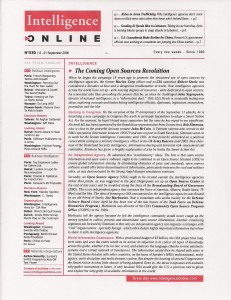
The National Commission on Terrorist Attacks Upon the United States (9/11 Commission) was created to examine how the terrorist attacks of September 2001 could have occurred and what could be done to prevent future attacks. Among other things the Commission recommended that there should be a National Intelligence Director who would have “two main areas of responsibility” namely:
1) to oversee intelligence centers on specific subjects affecting national security; and
2) to oversee the national intelligence program and the agencies that contribute to it.
In effect the Commission wished to have a single authority that could that could task and co-ordinate the processes and operations of the U.S. Intelligence Community (IC). The U.S. Congress was more or less forced to act on this specific recommendation because of public pressure. Thus the position of Director of National Intelligence (DNI) was created by the Intelligence Reform and Terrorism Prevention Act of 2004.
In April 2005, Ambassador John D. Negroponte, former Ambassador to Iraq, was sworn in as the first DNI. Negroponte was chosen because no qualified candidate from the so-called IC was willing to take the job. In truth, the DNI was forced on the Federal Government by outside forces and began with no support either in the Congress, the Executive Branch, or the so-called IC. Indeed President Bush made it clear that he considered the DNI unnecessary. The position of DNI had responsibility for, but no authority over the IC, had no ready made constituency within the government, and was considered an unnecessary intrusion on intelligence operations by the principal members of the IC.
Continue reading “Assessment of the Position of Director of National Intelligence”


